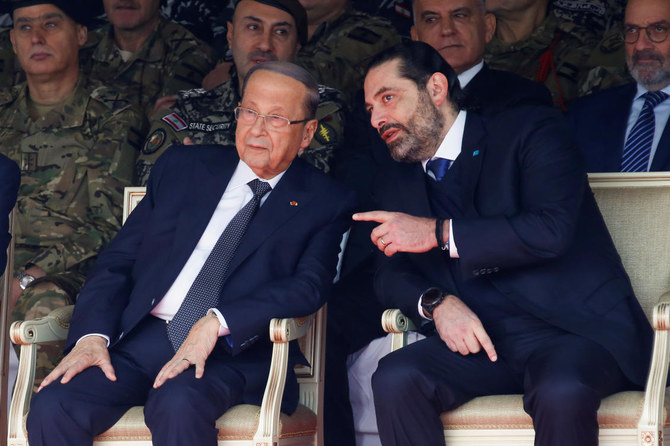BEIRUT: Lebanon’s caretaker Prime Minister Saad Hariri on Tuesday struck his name off a list of candidates to head a new Lebanese government.
Hariri, who recently resigned as premier under pressure from protesters, said he refused “to be falsely held responsible for delaying the formation of the new government.”
His sudden announcement will come as a blow to President Michel Aoun, Hezbollah and the Amal Movement, which together were pinning their hopes on having Hariri’s support to help establish a techno-political administration in the country.
The former PM’s decision came as national protests throughout Lebanon against the political elite entered their 41st day and followed rioting in Beirut between anti-government demonstrators and Hezbollah and Amal supporters.
Russia pledged its support for the Lebanese state during the current “delicate” period, while the UN Security Council called on “all actors to conduct intensive national dialogue.”
In a statement, Hariri said he was “sticking to the rule ‘not me, but someone else’ to form a government that meets the aspirations of young men and women. The state of chronic denial seemed to use my positions and proposals of solutions as a pretext to continue its intransigence and maneuvers and its refusal to listen to the people’s voices and their rightful demands.”
He reiterated his commitment to a government of technocrats to end “the severe economic crisis” gripping Lebanon and urged Aoun to “immediately call for binding parliamentary consultations, to designate a new prime minister to form a new government.”
Opinion
This section contains relevant reference points, placed in (Opinion field)
Meanwhile, Amal and Hezbollah supporters on Monday evening returned to challenge street protesters by organizing provocative motorcades through central Beirut and near to protest squares in the capital. Groups chanted, “the people want a new May 7,” in reference to the armed operation that Hezbollah carried out against the Future Movement in Beirut in 2008.
Mohammed Kabbara, a member of the Future bloc in Parliament, said: “What is happening in Lebanon has become beyond reason and puts Lebanon in a dangerous circle at all levels.”
Researcher in social movements and an activist in the Lebanese civil movement, Nizar Hassan, told Arab News: “The pressure from the political authority on the movement is not surprising. This scenario has been expected since the resignation of the government.
“This authority has limited options. The first is to form a government that meets the aspirations of the people, but it cannot form such a government because it wants a government that meets the political ambitions of Hezbollah, Aoun and Hariri.”
“The second option is to extend the period of the resigned caretaker government to cause confusion and incite against the revolution to minimize its momentum in the street and to bring fear into the hearts of the people by assaulting them.
“Hezbollah and the Amal Movement were shocked by the fact that people from their environment joined the civil movement. So, they tried, with other parties, to respond by dividing the street along sectarian lines.”
He added: “Our next step is to target the banks with our insistence on an independent government whose project is to save the country economically and not save capital.
“The authority is trying to fight the battle of public discourse, after the revolution took control of this discourse, and the authority is trying, through its political discourse, to stress that things cannot be solved in the street and that the authority cannot be held accountable in the street.
BACKGROUND
Hariri’s decision will come as a blow to President Aoun, Hezbollah and the Amal Movement, which together were pinning their hopes on having his support to help set up a techno-political administration.
“We are redirecting the discourse. The issue is not security or sectarian. It is an economic discourse. People came down for their living demands.”
Political activist, Ibrahim Mneimneh, told Arab News: “The civil movement continues regardless of the events and pressures it is subjected to, based on the development of political awareness among people and away from sectarianism and the movement’s commitment that the people want to hold everyone accountable without exception.”
Russia’s Ambassador to Lebanon Alexander Zasypkin conveyed to Aoun the Russian leadership’s support for the Lebanese state in the face of developments and assured him that Moscow would “not hesitate to meet what Lebanon asks for in these delicate circumstances.”
The Russian backing came hours after the UN Security Council unanimously issued a statement calling on “all actors to conduct intensive national dialogue and to maintain the peaceful character of the protests by avoiding violence and respecting the right to peaceful assembly in protest.”
It also stressed “the importance of the timely formation of a new government able to respond to the aspirations of the Lebanese people and to restore the stability of the country within the constitutional framework.”



































